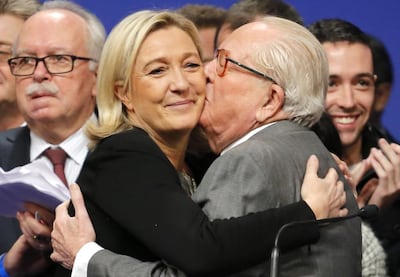Marine Le Pen's run on Sunday for France's presidency is the culmination of a five-decade rise of the far-right from a fringe movement to one of the country's strongest political forces.
Although Ms Le Pen is not expected to win, her National Rally party — until 2018 the National Front — has become an electoral force in recent years with nearly a quarter of the country voting in support of its anti-immigrant policies in the first round.
The anti-immigration candidate has pledged to introduce a ban on the wearing of the hijab in public if she wins the election on Sunday. Critics accuse her of fuelling “resentment and fear” of Islam.
The following is a chronology of the movement's rise.
1972 - The far-right National Front (FN) party is founded with former paratrooper Jean-Marie Le Pen as its president, but meets with little electoral success in its early years.
1986 - The National Front wins 35 out of 577 seats in parliamentary elections.
1987 - Jean-Marie Le Pen sparks an uproar by calling Nazi gas chambers a “detail of history”. Though the remark earns him a conviction for condoning crimes against humanity, he goes on to repeat it several times in later years.
2002 - Running for president amid a crime wave, Jean-Marie Le Pen's law-and-order focused campaign resonates with voters, qualifying him for a runoff vote by beating Socialist prime minister Lionel Jospin in one the biggest political upsets of modern France.
Incumbent Jacques Chirac goes on to win a second term with 82 per cent of the runoff vote, as electors from both the left and right rally behind the conservative to smash any chance of Le Pen winning the presidency.

2002 - Le Pen's daughter Marine starts to take a bigger role in the National Front.
In the following years, the party begins courting some voters traditionally on the left and distances itself from some of Jean-Marie Le Pen's harder lines.
2011 - Marine Le Pen is elected as party president.
2012 - Marine Le Pen makes her first run for the presidency, coming in third in the first round of voting with 18 per cent of the vote. Her niece, Marion Marechal, becomes a National Front member of France's National Assembly.
2014 - After a purge of members opposed to Marine Le Pen's softer line, the party wins nearly a quarter of the vote in European Parliament elections — for the first time coming out ahead of the Socialist Party.
2015 - The party's leadership expels Jean-Marie Le Pen after he calls into question his daughter's efforts to “de-demonise” the party and repeats his remarks about gas chambers.
The National Front wins nearly 28 per cent of the first round vote of regional elections, ahead of the conservative Republicans and the Socialists. However, it does not win control of any region in the following runoff vote.
2018 - Marine Le Pen proposed renaming the party National Rally. This was confirmed by a ballot of party members.
2017 - In her second run for the presidency, Marine Le Pen qualifies for a runoff against Emmanuel Macron with 7.7 million votes in the first round. She goes on to lose to Macron with only a third of the runoff vote.
2022 - Ms Marechal, who had quit politics after repeated clashes with her aunt, comes back to support rival far-right candidate Eric Zemmour.
2022 - In her third presidential run, Le Pen qualifies again for a runoff against Macron with 23 per cent of the first round vote. Polls indicate she will once again lose to Macron, although by a much smaller margin than in 2017.






















